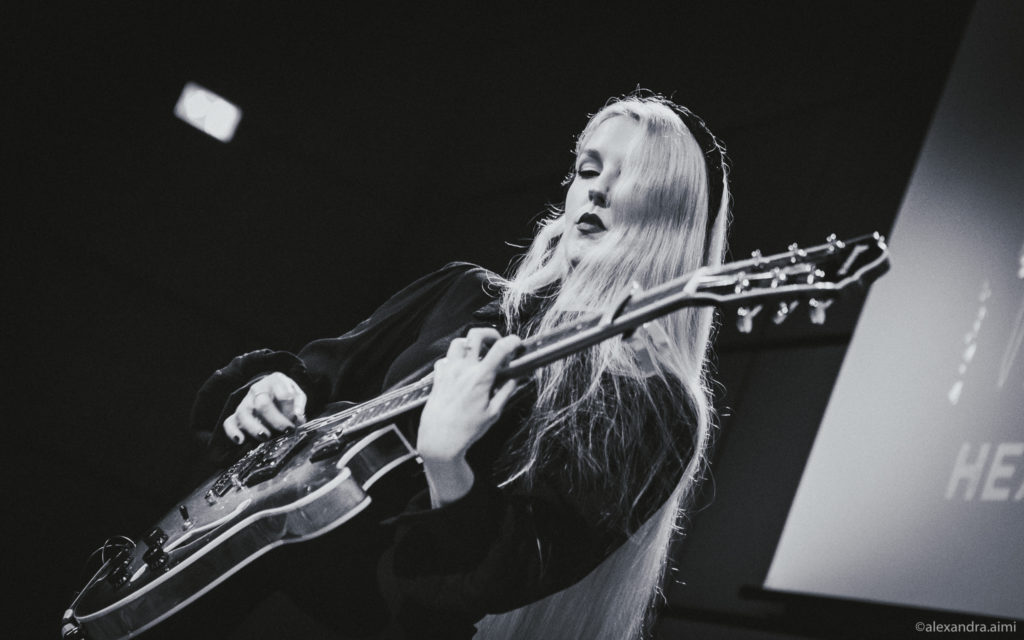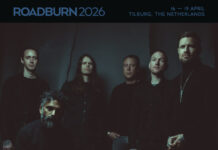On the closing day of the Der Harte Norden exhibition in Berlin, we sat down to talk with the talented Norwegian multi-instrumentalist SYLVAINE about her music road in the Black Metal scene, hardships, and influences. Read the complete interview here…

My first question is about the black metal scene, generally. Basically, it’s a very heavily male-dominated scene, there are very few women – I can count them on my fingers. How do you and your music – especially if you consider black metal overall… it’s pretty raw, it’s very aggressive and your music has this very, as I said earlier, feminine, a very melodic element to it – how do you feel in the scene as of now, specifically in the black metal scene?
Yeah, the funny part is that I don’t think I ever used the words black metal in my music. I never claimed that SYLVAINE was a metal band at all, let alone a black metal band. But we were embraced by the scene because of… or I was embraced by the scene because of, I guess certain elements in the music, like the distorted vocals and either some of the drum patterns and stuff like that. But otherwise, it’s the scene that’s, as you said, it is very heavily dominated by a male influence and if it can be called emotions. There’s definitely a more masculine feel with anger and frustration. Heavier emotions are present. It is a bit weird being someone who identifies as a woman in the scene and also even weirder because my music isn’t, especially black metal. It has some of it in it, but it’s also like, very pop somehow. It has a mixture of a lot of stuff, which I have also, of course, been criticized for. But I never claimed to be part of the metal scene, and it’s a very nice scene too, but it meant that I had the feeling of having to prove myself more. Because you have to kind of prove that you’re not this like, for lack of a better way to say, “blonde bimbo” or like, a pretty face or something stupid, like that.
So, you kind of have to maybe perform at a higher level in all ways, not just musically, but also on the admin side and how you deal with your professional connections and everything. You have to prove yourself over and over and over again, maybe more than a male counterpart would have to. And you also have to deal with a lot of, like you know, derogatory comments. Like “Who’s writing your music?” Because people don’t believe that it’s you or not, “Who does the screaming, the voice on your albums?” I’m like “It’s me.” Or you know, people trying to dumb down when they talk about gear or talk about stuff, because they assume that because I identify as female basically, I don’t know what I’m talking about. So that’s not ideal. That’s something I hope that future women and girls won’t have to deal with that down the line. But in general, it’s kind of also how you take this. I mean, you know, that this isn’t right and a lot of your male friends will also know this isn’t right, and they won’t be a part of the group that does this, so you can just go: “Well, that’s their problem.” That’s their stupidity and you can use it as fuel to prove them wrong. Although, again, you shouldn’t have to prove anyone wrong. It is what it is. So definitely, it’s a bit of a challenge, and also, you get compared automatically to other bands that have like, female fronted or that are dominated by a female figure no matter if the music is similar, or not. It’s just because you are the same gender [laughs].
Doesn’t make any sense.
No, exactly! We’re not saying that the VENOM and I don’t know, FOO FIGHTERS sound the same, you know, just because they’re guys [laughs]. Yeah, it’s not the easiest, but I think the music business in general has always been very male-dominated. And, of course, the metal scene has always been a bit more than maybe other genres.
So, yeah, it’s very interesting because I thought, not black metal specifically, but if we take extreme metal in general, because they’re more open to women or women bands, or women-led bands, right? Because we have, DORO, the first badass metal woman. And then Angela Gossow, excuse me, she pioneered extreme female vocals. I thought that this kind of behavior was rudimentary, especially these days, you know? But you’re telling me now that in the black metal scene, it persists.
You know black metal is evolving, but I think it’s taking a little bit of time because it’s been a drama. It’s been fairly close. And there was even if it’s supposed to be very much about individualism and being free in your expression. It’s also been very, very limited actually, it’s been a very specific framework around. What actually is black metal? What is this supposed to sound like? What do the people who are supposed to be in this genre look like? How are they supposed to act?
MAYHEM set the bar too high.
Yeah, exactly [laughs]. But yeah, exactly that’s it. I think that step by step, that kind of boundaries are being expanded, but is something that’s still present. And the gender equality isn’t completely there yet, but we’re getting there, I think. Slowly like baby steps. I think if any kind of person identifies as female in the scene if you ask them if they’ve had this kind of experience, I think they will have many stories to tell you.

Unfortunately, I remember when I discovered MYRKUR, she had some backlash, when she only entered the scene because she has a pop background. Even like, if we speak about black metal in general, we had ULVER that pioneered basically this very melodic, very not black metal sound. So when she was doing her music, especially for the first albums, it was very similar to ULVER. But she was attacked, because she’s a woman, and she’s in black metal, and she sings more poppy. It’s hypocrisy guys.
Yeah. Exactly. Of course, that’s it. You know, when you’re a woman in this kind of scene, you have to be super careful with how you prepare yourself visually, what you say. Because if there’s any little margin of like, you know, anything, people will attack you. For example, I remember posting a picture online, a promo picture from my third album and I credited who had made my outfits and also the makeup artists for the shoots. Because in my world, everyone’s an artist. And when you have someone working with you, you credit them because you appreciate each other. We have to work together, we have to build upon each other and I was completely harassed for that because people were like “This is not a fashion show, who do you think you are?” [laughs] It’s as you said, you have to be really careful with how you portray yourself and I never actually said that I was black metal, I think she [MYRKUR] might have put this genre tie on herself, which I think is also why she was attacked so much more. But that’s what’s so messed up. It shouldn’t be like that.
Speaking about music you say you’re not particularly black metal and you never identified as black metal, but you do have influences of black metal. What are those influences?
Yeah, I mean not that I said I don’t identify with black metal, because obviously, I do, it is the genre that I like, but it’s just I never said that SYLVAINE‘s music is black metal. So basically, I have influences from all over the place. That’s the thing. Musically speaking, I’m very open-minded when it comes to music and I’m inspired by a lot of different stuff, and black metal is something I got into quite late in life. When I was 20-21 years old, something like that. I started with rock, melodic rock, and then it evolved into some kind of more gothic rock. And it got heavier and heavier from there until I met the black metal scene and I liked the bands. Like for example, EMPEROR has this emotional, and atmospheric quality. This is one of my favorite black metal bands. So even though I am absolutely incapable of playing anything even remotely as technical as them [laughs], the atmosphere is still there which I appreciate. So, that’s something that I – being a Norwegian – recognize a lot of this ambiance and atmosphere that is in this kind of music. It’s like a cliche to say but it does feel like walking through the woods, you know, or in the forest or, it’s kind of a Norwegian cold spirit that I can feel. It speaks to me and this is something that I use in my music, as well as these kinds of, let’s call them black metal tools, like the screamed vocals which for me is not about anger. It’s more about when the clean vocals no longer have the emotional weight to them anymore. It’s like “Oh okay, I just have to scream this.” So you understand just how severely I feel this emotion. It’s not necessarily anger, it’s actually never anger, but so this, and we also have like, for example, the distorted guitars, a tremolo guitarist, and blast beats. I like the patterns in the drums that are typical of the scene, also because I was always attracted to opposites in music. I really like it when it’s not just the same the whole time but when you have the balance between opposite forces because, for me, that’s the reflection of life. I usually let people decide what they want to call my music because I think genres can be really hard to define sometimes. And I am also not sure there’s a point in defining it, because art is abstract.
I agree with most of what you said. It is stupid to put a label on a genre because music is evolving. Like every art form is evolving. This is natural. So what is your favorite EMPEROR record?
Well, I mean… [laughs]
I had to ask because you mentioned them earlier.
“In the Nightside Eclipse” is great. It is fantastic. So I think I just have to go with that. Not very original, I know, but it just, has something amazing, you know. I just saw them for the first time live this year.
Was it Beyond the Gates Festival?
No no, it was Inferno Festival actually in Oslo. I’ve been somehow missing EMPEROR shows ever since they did the comeback like at Hellfest. I remember I was watching that livestream and everything, but yeah, this year I finally saw them live.
Those were my short questions, thank you so much for giving me a lot of information and sharing your opinion and how you feel about everything!
Interview by Alexandra Aim





